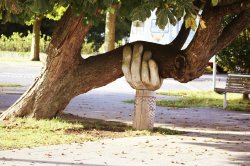Students may not recognize that they will benefit from academic support, they may associate help-seeking with weakness, or they may be unaware of the resources available to them. Encourage help-seeking.
This week’s “Be a Strong Student” message to students asks them to “Seek Academic Help.” Help-seeking behaviors are least practiced by people who most need help, not surprisingly, so it’s those students we need to guide most. Here are some strategies instructors can implement to normalize help-seeking behaviors.
In your course
- Provide frequent low-stakes assessments that allow students to see concretely how they are doing.
- Encourage students to check their grades regularly to have a sense of their progress in the course.
- Require students to attend tutoring or another academic support appointment and follow-up to make sure they have attended. Many students who would benefit from tutoring do not choose to go if it’s optional or encouraged.
- Normalize struggle and instill a growth mindset in students, including the role of help-seeking behaviors.
- Send a quick email to students who are doing poorly, stating your concern and inviting them to meet with you.
- Demystify office/students hours and help students understand their many purposes: from help seeking to conversation to feedback on assignments, and more. Some students may associate office hours with punitive demands in high school to “stay after to talk to the teacher.”
- Invite individual students into office hours and/or recommend all students drop in at some time during the semester.
- Require students to meet with you 1-1. One way to do this is to withhold grades, writing the comment, “See me for at office hours and then I can release our grade.”
Understand Resistance to Help-Seeking Behavior
- Students who received high grades in high school are often shocked to receive lower grades in college and do not know what to do.
- Shy students might feel uncomfortable approaching you or others for help.
- Many students don’t think they are doing “poorly enough” to need tutoring.
- Students may not perceive the value of help-seeking based on prior experiences.
Connect students to campus resources
See academic support partners on this page for a detailed list. They are also listed in the Montclair Syllabus. Remind students that there is no extra cost for these services.
- Raise alerts in Navigate to assign students to tutoring during the mandatory reporting periods or at any other time. Remind students to log in to Navigate to see instructors’ detailed comments.
- Refer students to the Center for Academic Success and Tutoring (CAST) for a variety of support, including subject tutoring and workshops.
- Refer students to the Center for Writing Excellence (CWE), for in-person or online consultations and/or workshops.
- Refer students to the Disability Resource Center (DRC) for accommodations.
- Refer students to Reference and Research Librarians for help with research.
- Remind students to connect with their academic advisor: Academic Advising is available for all students, with success centers in every college and school
- Point students to the Public Speaking Resource Center (PSRC) for assistance and coaching for individual or group presentations.
- Connect with the CARE Team. Complete a CARE report for students who may need to be connected to services to address academic (as well as social and physical/mental health) concerns.
To learn more about campus support, check out this session recording on Panopto: Strong Student Campaign: Academic Support Partners to Help Your Students.
Other resources: The Disability Resource Centers offers a training workshop, Disability, Awareness, Training, and Empowerment (DATE). It takes a broad perspective in examining the activities, attitudes, myths, misunderstandings, technologies, and pedagogical practices that can limit inclusion in the university setting. In a 90-minute, highly interactive session, attendees will gain a better understanding of disability law; the rights and responsibilities of the institution, its faculty, staff, and students; and best practices for inclusion for individuals with disabilities. Unless otherwise listed, training is open to all students, faculty and staff with an interest in creating and promoting inclusivity and access. Please register by selecting the hyperlink of your preferred date.
- Tuesday, September 24, 1-2:30 p.m., Cole Hall, Room 340
- Thursday, November 14, 11 a.m. – 12:30 p.m., Cole Hall, Room 340
For more information or help, please email the Office for Faculty Excellence or make an appointment with a consultant.
Last Modified: Friday, August 30, 2024 3:23 pm
CK![]()
Teaching Resources by Montclair State University Office for Faculty Excellence is licensed under a Creative Commons Attribution-NonCommercial 4.0 International License
Third-party content is not covered under the Creative Commons license and may be subject to additional intellectual property notices, information, or restrictions. You are solely responsible for obtaining permission to use third party content or determining whether your use is fair use and for responding to any claims that may arise.
